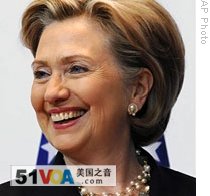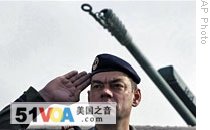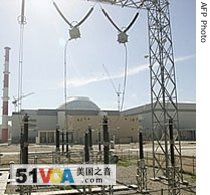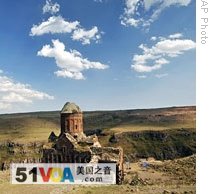Istanbul
06 March 2009
 |
| US Sec. of State Hillary Clinton arrives for a meeting of the EU-US Troika in Brussels, 06 Mar 2009 |
Secretary of State Clinton's efforts to bring peace to the Middle East is expected to be at the top of her agenda in Ankara.
Analysts note Turkey's ties with Hamas and with countries in the Arab world make the country an important asset, and Ankara is also reported to be mending fences with Israel after a war of words between the two counties over the recent Israeli military operation into Gaza.
Another difficult issue expected to come up during the Clinton visit will be Afghanistan, and the Secretary of State is expected to press Turkey to increase its military forces there.
 |
| A Turkish soldier salutes during the Regional Command Capital transfer of authority from Turkish to Italian forces at NATO-ISAF's multi-national brigade in Kabul, (2007 file photo) |
International relations expert Soli Ozel of Bilgi University says that will be hard sell to Turkey's armed forces chiefs.
"Look if you do indeed have in Kabul have a situation where other country's soldiers are wearing Turkish soldiers uniforms because it is a lot safer in the streets that tells you something about the kind of the prestige that the turks enjoy in Kabul, would you really want to ruin this by sending fighting troops to the south," Ozel said.
But analysts say there is not only military opposition to such a move. The country's Islamic rooted government also has ideological concerns over the Turkish army being engaged in the war against the Taleban according to Ozel.
"There is this issue Turkish troops fighting Muslims they don't want to give this impression, how are going to explain the body bags that are inevitably going to be coming. It is the same kind of concerns that the Germans and others express with the added dimension of Islamic orientated government being in power the country being overwhelmingly Muslim and not seeing the operations in Afghanistan necessarily as legitimate as other NATO members do," said Ozel.
 |
| A general view shows the reactor building of the Bushehr nuclear power plant, in southern Iran (File) |
Gokhan Cetinsaya is an adviser to the Turkish foreign ministry on Iran he says Ankara is well placed to help defuse tensions.
"There are good relations with Iran, there are good relations with the United states . I think Turkey is in that sense, Turkey is in a very unique position. Probably this is an unofficial role and in that case probably you can facilitate their communication their understanding and you can inform them about intentions and discourse of the other side," he said.
Another focus of Clinton's talks Saturday will likely be Iraq, where the United States is planning to draw down its forces. The Turkish foreign minister this month indicated that United States would be allowed to use Turkish territory for the withdrawal. But that cooperative spirit could be compromised by the ongoing effort in the U.S. Congress to push through a motion to recognize the mass killings of Turkish Armenians in 1915 by then Ottoman forces as genocide - a charge Ankara strongly denies.
 |
| A 23 July 2008 file photo of a ruined church near the Turkish-Armenian border, in the now- uninhabited capital of a medieval Armenian kingdom |
"That would be seen as an insult to our efforts to make peace. There would be important implications. Turkey today provides 70% of all the logistical goods to all the US troops in Iraq. Turkey is an important player in NATO, we have the second largest military in NATO in the United States. We are together in most of the peacekeeping operations. But we have saying the head that wears the crown is wiser. Once the US president sits in their office and understand turkey's role in the security in this very difficult part of the world, they try not to interfere the local domestic issues," said Bagis.
During her meetings, analysts say Clinton will likely hear that Turkey is working hard to improve relations with Armenia including resolving historical disputes. She is also expected to again be made aware that anti-U.S. sentiment in Turkey is amongst the highest in the world. But analysts say with Mr. Obama's election is being overwhelmingly welcomed both in the country and in government, Clinton's visit comes at an opportune time.